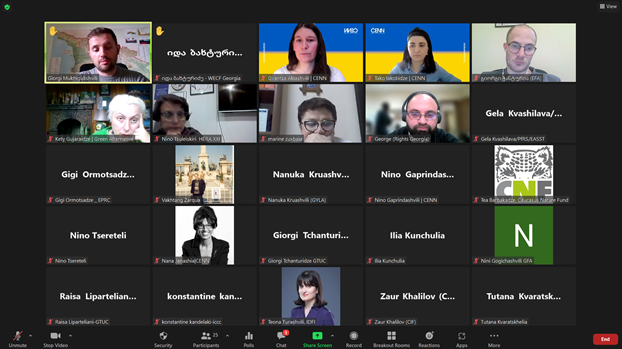CENN, with the support of the German government, supports multi-stakeholder dialogue by unifying non-governmental organizations from various fields to strengthen CSO engagement in the SDGs implementation process across the country.
On March 30, the first joint meeting of CSOs representing all four Thematic Working Groups of the SDG Council of Georgia took place. Representatives of up to 20 non-governmental civil society organisations discussed their involvement in monitoring and reporting Georgia’s progress toward global Sustainable Development Goals.
The civil society actors became acquainted with the goals and activities of CENN’s new project – “Continued Nationalisation of SDGs via Promoting Localisation and Multi-stakeholder Engagement in Georgia”. They exchanged ideas on difficulties hindering meaningful cross-sector dialogue and emphasised the importance of proactive engagement. Starting active collaboration to find solutions to the challenges together and concrete further steps were agreed upon.
Within the project, CENN plans a consistent process to strengthen Thematic Working Group member CSOs, and build a strong community that comes together under one goal of boosting SDG implementation in the country.
Further steps include expert support to develop analysis, recommendations, and guidelines for CSOs and the SDG Secretariat on methods ensuring CSO involvement, which is crucial under the SDGs’ global agreement values. Capacity-building activities will increase the capacities of CSOs to monitor SDG implementation and link their activities with SDGs to be reflected in the VNR and annual monitoring report.
CENN’s “Continued Nationalisation of SDGs in Georgia” project aims to jumpstart SDG implementation, continue the nationalisation of new targets and commence the localisation of SDGs in Georgia. By strengthening the capacity of the SDG Council’s Secretariat and Thematic Working Groups, the project supports the development of institutions that will ensure the long-term sustainability of the steps taken by the country toward the Sustainable Development Goals. Thus, it contributes to the country’s sustainable development. The program is financed by Deutsche Gesellschaft für Internationale Zusammenarbeit (GIZ) GmbH on behalf of the German Federal Ministry for Economic Cooperation and Development (BMZ).

